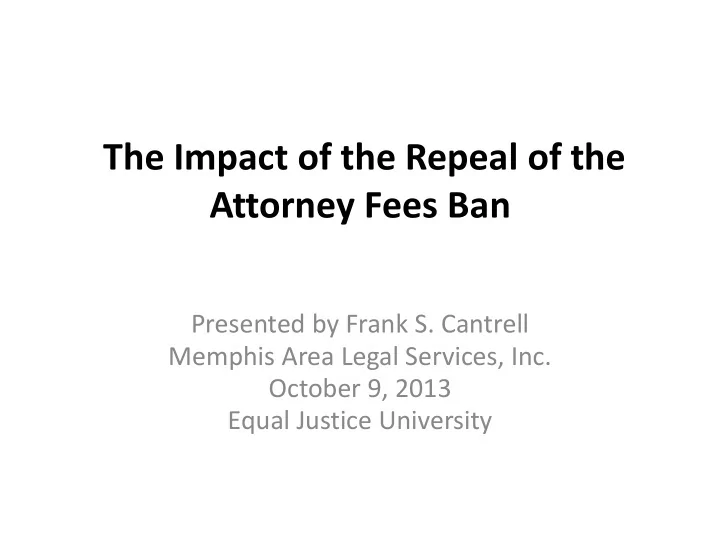

The Impact of the Repeal of the Attorney Fees Ban Presented by Frank S. Cantrell Memphis Area Legal Services, Inc. October 9, 2013 Equal Justice University
History • Prior to 1996- Could recover fees from opposing parties • 1996 appropriations bill- Banned recovery of fees • 2010 appropriations bill- Lifted the ban • LSC Final Rule effective April 26, 2010 amended 1642- Allows recovery of fees • No effect on 1609, Fee-Generating Cases
Survey • August 2013 MALS sent a survey to all LSC- funded organizations (and many non LSC- funded) • Received 26 responses • 19 LSC-funded • 7 non LSC-funded
AREAS OF SURVEY • Fees collected by year since 2010 • Recovery by substantive priority area • Legal basis for recovery • Recovery by judgment or settlement • Budgeting for recovery • Incentives for recovery • Lessons learned or tips for others • Prevailing questions
FEES COLLECTED BY YEAR
FEES COLLECTED BY YEAR
Fees Collected vs. Annual Budget in Millions
Fees Collected vs. Annual Budget in Millions
Fees Collected vs. Number of Attorneys
Fees Collected vs. Number of Attorneys
Recovery by Substantive Priority Area
Recovery by Substantive Priority Area
Legal Basis for Recovery • Theories used by non LSC-funded organizations: – FLSA/Agricultural Workers’ Protection Act – 42 U.S.C. § 1988 – 42 U.S.C. § 1983 – SSD/SSI fees on back payment awards – Landlord/tenant laws – FDCPA – Consumer protection laws
Legal Basis for Recovery • Theories used by non LSC-funded organizations (cont.) – ADA – Fair housing laws – Breach of contract
Legal Basis for Recovery • Theories used by LSC-funded organizations: – ADA – FLSA/Agricultural Workers’ Protection Act – False Claims Act – Equal Access to Justice Act – WARN Act – VAWA – Consumer protection laws
Legal Basis for Recovery • Theories used by LSC-funded organizations (cont.): – Landlord/tenant laws – RESPA – Sanctions – Breach of contract – Contempt – Divorce, DV and other family law
Legal Basis for Recovery • Theories used by LSC-funded organizations (cont.): – FDCPA – 42 U.S.C. § 1983
Judgment or Settlement Recovery of fees by settlement exceeds recovery by judgment by approximate 60/40 ratio
Budgeting for Recovery • Of 7 non LSC-Funded organizations responding, 6 budget for recovery • Of 18 LSC-funded organizations responding, 9 budget for recovery • In 2010 only 1 of the LSC-funded organizations budgeted for recovery; 5 in 2011; 6 in 2012 • Those who budget for recovery of fees tend to recover more fees
Budgeting for Recovery • Non LSC-Funded: – $50,000/$687,000 = 7.3% – $25,000/$700,000 = 3.6% – $350,000/$5.1 million = 6.9% – $390,000/$5.14 million = 7.6% – $250,000/5.17 million = 4.8%
Budgeting for Recovery • LSC-Funded – $50,000/$3.15 million = 1.6% – $5,400/$5 million = < 1% – $40,000/$6 million = < 1% – $25,000/$6.1 million = < 1% – $100,000/$8.9 million = 1% – $3,175/$9.1 million = < 1%
Incentives for Recovery No responding organization reported a specific monetary incentive for recovery of fees
Tips for Recovery • Thoroughly educate the judiciary on the role of your organization • Keep detailed, itemized records of time spent on a case • Begin discussing attorney fees with from the outset of the case • Emphasize to client the importance of collecting attorney fees
Tips for Recovery • Have retainer agreement containing the client’s consent to your seeking fees from the opposing party • When calculating reasonable fees: – Use prevailing market rate standard – Consider the the experience of the lawyer – Take into account the complexity of the case
Concerns Regarding Recovery • Setting attorney fee amount in a negotiated settlement • Handling conflict between legal aid attorney’s demand for fees and client’s interest in securing the best settlement • Appropriately handling lump sums • Taxation of attorney fee awards
Recommend
More recommend